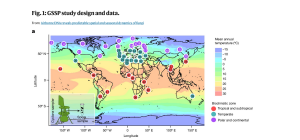 Transnational Access provided the means to conduct fieldwork needed for a study that resulted in a Nature publication named “Airborne DNA reveals predictable spatial and seasonal dynamics of fungi“.
Transnational Access provided the means to conduct fieldwork needed for a study that resulted in a Nature publication named “Airborne DNA reveals predictable spatial and seasonal dynamics of fungi“.
Fungi are diverse and ecologically vital, but their distribution is not well understood. To investigate, a global study was conducted, where airborne fungal spores across various climates and seasons were sampled. It was discovered that most fungi are restricted to specific climateThe average weather we would expect over a long period of time (seasons, years, decades). Climate varies from place-to-place across the Earth. Climate is determined by long-term (over at least... More zones, with tropical regions showing the highest diversity, except for certain fungi thriving in temperate areas. The study indicates that fungal distribution is influenced by evolutionary history and climateThe average weather we would expect over a long period of time (seasons, years, decades). Climate varies from place-to-place across the Earth. Climate is determined by long-term (over at least... More, with some fungi only releasing spores seasonally. This research reveals that fungi follow predictable distribution patterns, similar to other organisms, contributing to the debate on microbial versus macro-organism biodiversityBiological diversity. The many and varied forms of life on Earth (collectively known as biota). As well as diversity of species (species diversity), there is also diversity within populations of a... More rules.
